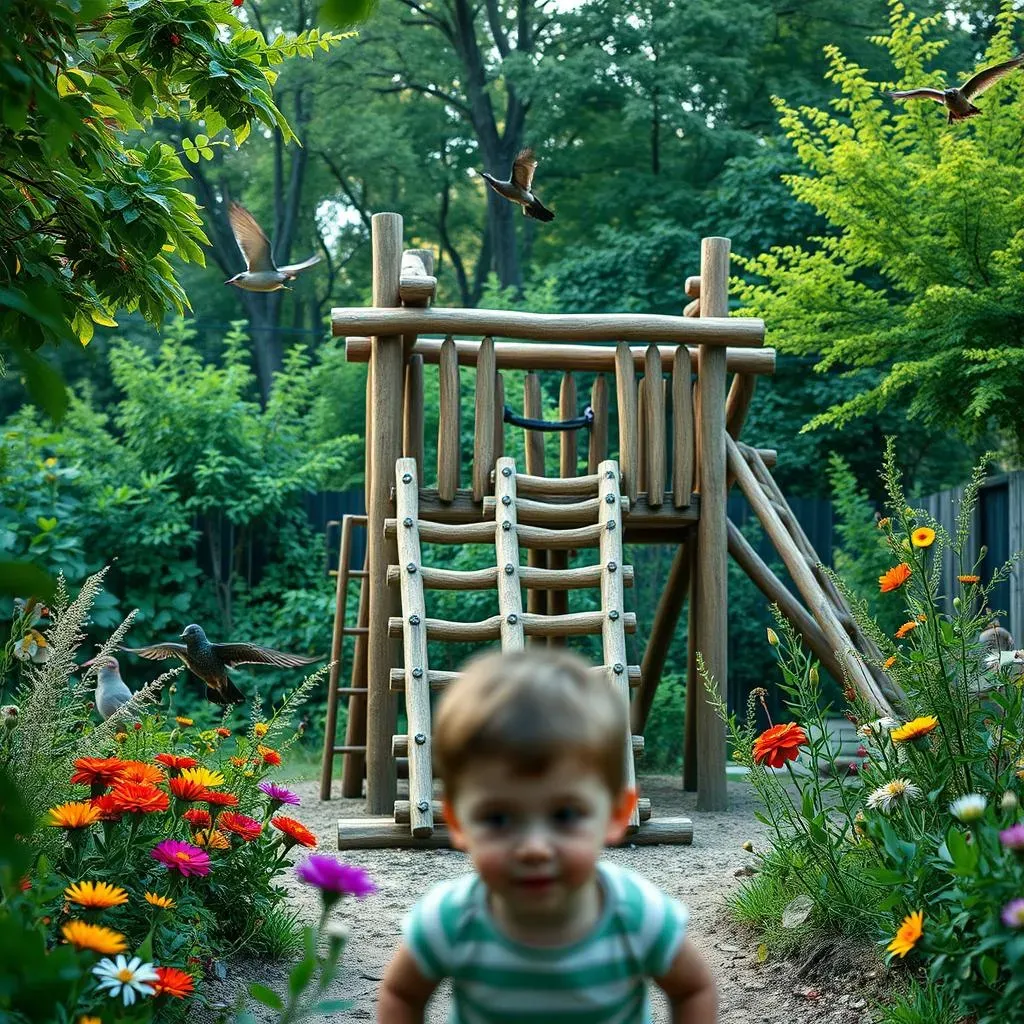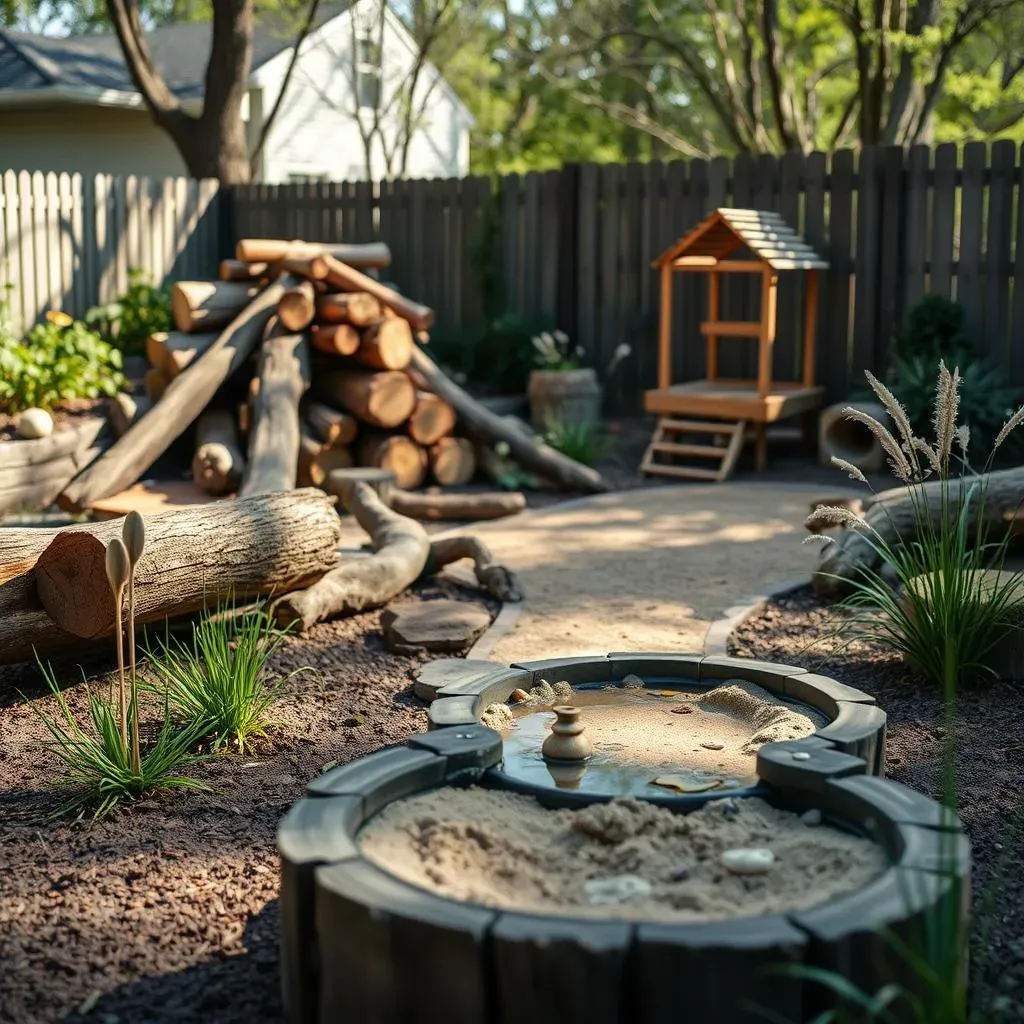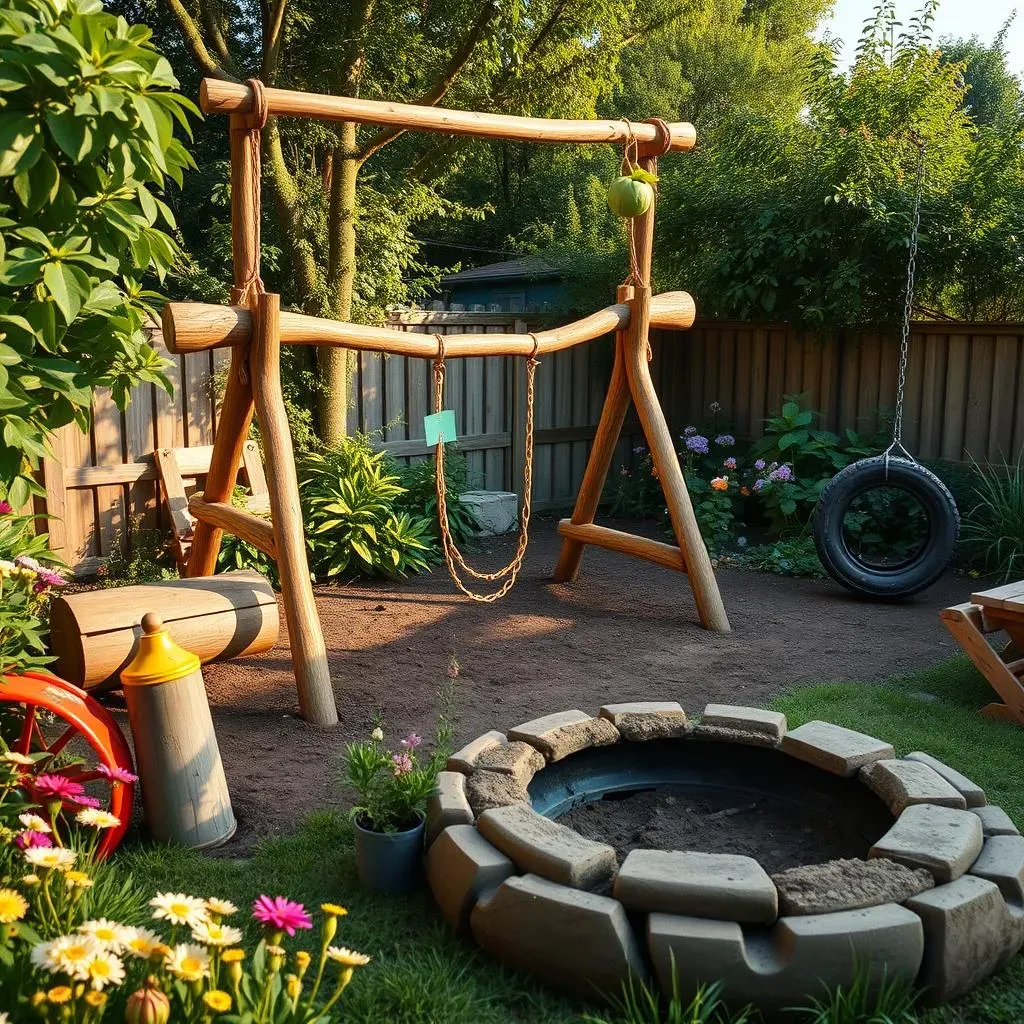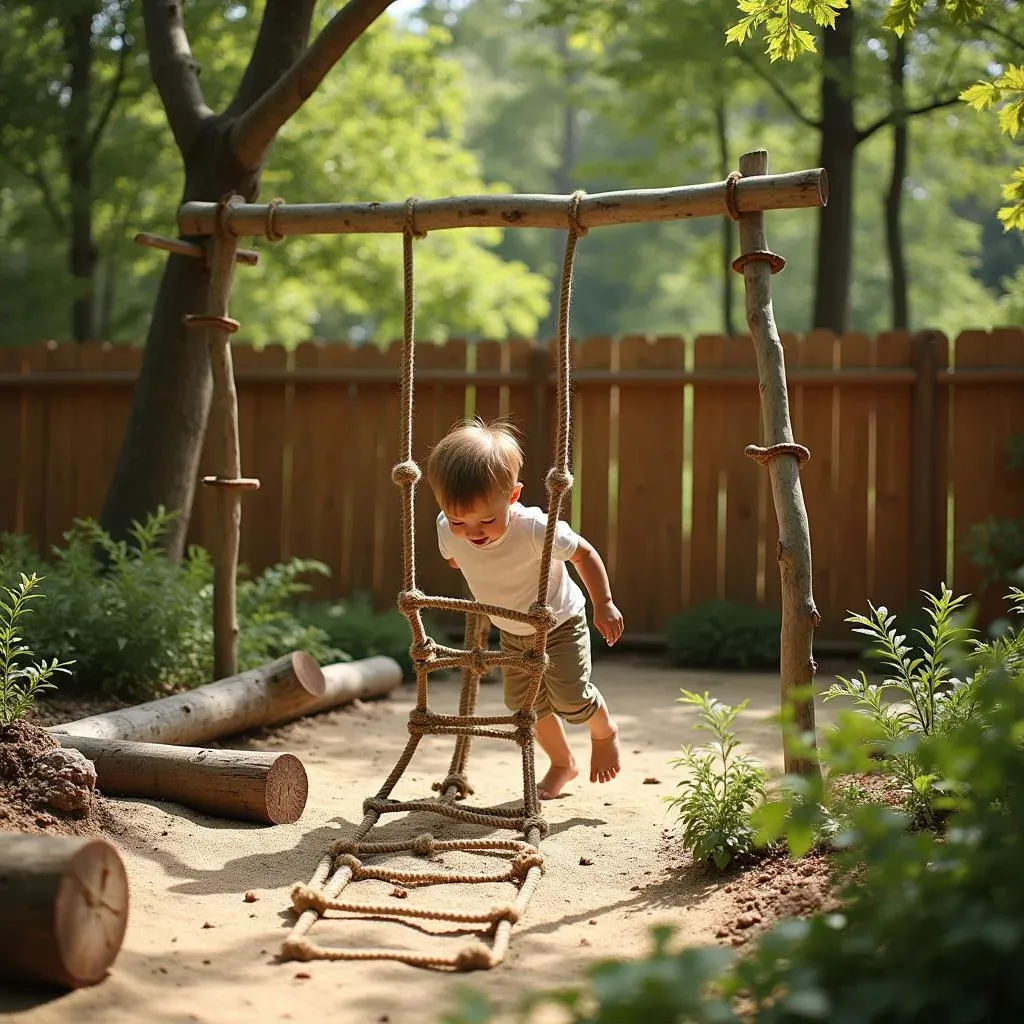Table of Contents
Tired of the same old plastic play sets? Dreaming of a backyard that sparks your kids' imagination and gets them closer to nature? You're in the right place! This article is your guide to creating amazing natural backyard playground ideas. We're not talking about sterile, cookie-cutter play areas. We're talking about spaces where kids can get muddy, explore textures, and connect with the natural world. Think less plastic, more plants; less manufactured, more magical. We'll show you why choosing natural materials is great for your kids and the planet. Then, we’ll get into the nuts and bolts: the essential elements you'll want to include, followed by budget-friendly DIY projects. Finally, we will touch on how to make sure your backyard nature haven stays a fun and safe place to play. So, get ready to ditch the boring and embrace the wild – let's build a playground that's as unique as your kids are!
Why Choose Natural Backyard Playground Ideas?

Why Choose Natural Backyard Playground Ideas?
Beyond the Plastic Jungle
Let's be real, most playgrounds are a sea of plastic, right? Swings, slides, the whole shebang. They're functional, sure, but they don't exactly scream "adventure." Natural playgrounds, on the other hand, bring a totally different vibe. Think of it as bringing the forest to your backyard. It's about using natural materials like logs, rocks, and plants to create a space that feels more like an exploration zone than a typical playground. Kids get to interact with the environment in a way that feels more authentic, and honestly, it's just way cooler looking.
I remember when we built a small climbing structure using fallen tree branches in our backyard. It wasn't fancy, but the kids were obsessed. They spent hours scaling it, making up games, and just generally being more active than they ever were on our old plastic slide.
Boost for Development
It's not just about aesthetics either. Natural playgrounds are incredible for kids' development. They encourage creativity because they're not prescriptive. A log isn't just a log; it's a balance beam, a seat, or a fort wall, depending on what the kids imagine. It's also fantastic for sensory development. Kids get to experience different textures, sights, and sounds. Think about the difference between touching a smooth plastic surface and feeling the rough bark of a tree. It’s a whole new world of tactile experiences. Plus, all that climbing, balancing, and digging are great for physical development too.
Benefit | Plastic Playground | Natural Playground |
|---|---|---|
Creativity | Limited, structured play | Open-ended, imaginative play |
Sensory Experience | Mostly smooth, uniform textures | Varied textures, sights, and sounds |
Physical Development | Repetitive movements | Varied movements, balance, and strength |
Eco-Friendly Fun
And let's not forget about the environmental aspect. Choosing natural materials for your playground is a much more sustainable option than buying plastic play sets that will eventually end up in a landfill. You can use recycled materials, fallen branches, and plants that are native to your area. It's a great way to teach kids about respecting nature and making choices that are good for the planet. Plus, you might even attract some cool wildlife to your backyard, which is a bonus in my book. It’s a win-win for everyone involved.
I've noticed a lot more birds and butterflies visiting my yard since we added more native plants to our natural play area. It's like we've created a little ecosystem right in our backyard.
Essential Elements for Your Natural Backyard Playground

Essential Elements for Your Natural Backyard Playground
The Building Blocks of Fun
Okay, so you're on board with the idea of a natural playground, awesome! Now, let's talk about what actually makes it work. It's not just about throwing some sticks in the yard and calling it a day. You want to create a space that’s both engaging and safe. Think of it like building a really cool fort; you need the right materials and a solid plan. So, what should you include? Well, first off, you'll want to consider the different play zones. Kids love variety, so having different areas for different activities is key. This could be a climbing zone, a digging zone, a water play area, and maybe even a quiet space for when they need a break from all the action.
When I started planning my backyard, I made a rough sketch of the yard, and marked different areas. It helped me visualize how the different zones would fit together. I also considered the existing trees and shrubs as natural elements I could include.
Key Elements to Include
Let's break it down. First, you need some good climbing elements. This could be a log pile, a small rock wall, or even a sturdy tree with some low branches. Next up, digging is a must! Kids love to get their hands dirty, so a designated digging area with sand or loose soil is always a hit. Water play is another winner, whether it's a simple water table or a small pond. Just make sure it's safe, of course. And don't forget about loose parts! Things like stones, pine cones, and sticks are fantastic for open-ended play. It's all about giving kids the resources to create their own fun.
- Climbing Elements: Logs, rocks, tree branches
- Digging Area: Sand, loose soil, shovels
- Water Play: Water table, small pond, buckets
- Loose Parts: Stones, pine cones, sticks, leaves
- Plants: Native plants, herbs, flowers
Safety First
Now, I know what you're thinking: "All this natural stuff sounds great, but is it safe?" Absolutely, as long as you plan it out properly. Always use materials that are sturdy and free from hazards. For instance, make sure any logs you use are stable and won’t roll. Be careful with any water features, ensuring they aren't too deep and are supervised when kids are playing. And when it comes to plants, choose non-toxic, kid-friendly options. Think about the layout too. Make sure there’s enough space between elements so kids can move around freely without bumping into things. With a little planning, you can create a space that’s both fun and safe.
I always double-check the stability of the climbing structures, and I make sure that there is no sharp edges or splinters. A little extra time on safety checks goes a long way.
DIY Natural Backyard Playground Ideas on a Budget

DIY Natural Backyard Playground Ideas on a Budget
Making it Affordable
Alright, so maybe you're thinking, "This all sounds amazing, but I don't have a ton of cash to throw at a fancy playground." No worries, you absolutely don't need to! The beauty of natural play spaces is that they can be super budget-friendly. It's all about getting creative and using what you have available. Forget those expensive, store-bought play sets, because we're going the DIY route. We're talking about using recycled materials, free resources from nature, and a little bit of elbow grease to create something awesome for your kids. It's amazing how much you can achieve without spending a fortune, it's more about imagination than money.
My most successful project was a mud kitchen I made from old pallets and some discarded kitchen utensils. The kids loved it, and it cost me next to nothing. It's all about repurposing and thinking outside the box.
Easy DIY Ideas
Let's get into some specific ideas, shall we? First up, a log balance beam. Find some fallen logs, make sure they're sturdy and safe, and you've got an instant balance beam. No need to buy anything! Next, how about a tire swing? Old tires are easy to find (check with local tire shops) and you can hang them from a sturdy tree branch. A digging pit can be as simple as a patch of dirt or a sandbox you build from scrap wood. For a water play feature, you can use a plastic tub, or even an old sink. And don't forget about loose parts! Collect stones, pine cones, and sticks from your yard or nearby parks. The key is to repurpose and reuse as much as possible.
DIY Project | Materials | Estimated Cost |
|---|---|---|
Log Balance Beam | Fallen logs | Free |
Tire Swing | Old tire, rope | Free - $10 |
Digging Pit | Sand, scrap wood (optional) | $0 - $20 |
Mud Kitchen | Old pallets, utensils | Free - $15 |
Water Play | Plastic tub, bucket | Free - $10 |
Getting the Kids Involved
Here’s the best part, get your kids involved in the process! Not only does it make the project more fun, but it also teaches them valuable skills. Let them help with collecting materials, building structures, and even planting flowers. It's a fantastic opportunity to get them outside and engaged in nature. When kids have a hand in creating their play space, they're more invested in it and more likely to use it. Plus, it's a great way to spend some quality time together as a family. It’s amazing what you can accomplish when you work together.
When we built our mud kitchen, my kids helped me collect the pallets and arrange the utensils. It was a bit messy, but they loved being part of the process.
Maintaining Your Natural Backyard Playground

Maintaining Your Natural Backyard Playground
Keeping the Fun Alive
So, you've built this awesome natural playground, congrats! But the job’s not quite done. Like any great space, it needs a little TLC to stay in top shape. Think of it as tending a garden; you wouldn't just plant it and forget about it, right? The same goes for your natural playground. Regular maintenance is key to keeping it safe, fun, and engaging for your kids. It’s not about making it perfect, but about ensuring it remains a space where they can explore and play without any worries. And honestly, a little bit of upkeep can go a long way in making sure your backyard haven stays awesome.
I have a set time every weekend to check all the structures and areas. It's like a little ritual, and it helps me catch any problems before they become big issues.
Regular Check-Ups
Let’s talk about what that maintenance actually looks like. First off, you'll want to do regular safety checks. This means inspecting all the structures for stability, looking out for any sharp edges or splinters, and making sure that any loose parts are still safe to play with. Clear away any debris, like broken branches or sharp stones, that could cause injury. It's also a good idea to check for any unwanted critters, like wasps or other stinging insects that might have made a home in your play area. It might sound like a lot, but it’s just a quick once-over to make sure everything is in good condition.
Maintenance Task | Frequency | What to Look For |
|---|---|---|
Structure Check | Weekly | Stability, sharp edges, splinters |
Debris Removal | Weekly | Broken branches, sharp stones, trash |
Pest Check | Monthly | Wasps, stinging insects, unwanted critters |
Plant Care | As needed | Watering, pruning, removing dead plants |
Keeping it Fresh and Fun
Beyond safety, you’ll also want to think about keeping the play area exciting. That might mean adding new elements, rearranging existing ones, or simply rotating the loose parts you have available. This helps keep the space fresh and prevents kids from getting bored. You could also refresh the digging area with new sand or soil, or add some new plants to the garden area. It’s about keeping it dynamic and allowing the kids to experience the space in different ways. Remember, the goal is to create a space that continues to inspire their imagination and encourage them to play outside.
I like to change things up every few months. I might introduce some new loose parts, move the logs around, or add a new plant. It keeps the space feeling new and exciting.
Wrapping Up Your Natural Backyard Playground Adventure
Creating a natural backyard playground isn't about perfection; it's about fostering a love for the outdoors and letting kids explore, learn, and grow. From the initial spark of an idea to the final touches of a mud kitchen or a log balance beam, the journey is filled with fun and creativity. Remember, the best playgrounds are those that adapt and evolve with your children's interests. So, embrace the mess, celebrate the small discoveries, and watch as your backyard transforms into a place where imagination knows no bounds. Now, go get building and let the natural adventures begin!